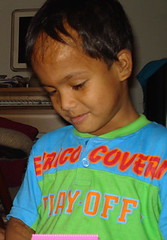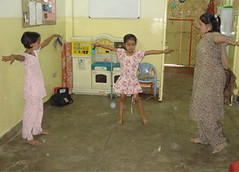
by Anuradha Bakshi | May 19, 2007 | utpal

How many times must up a man loop up, before he can see the sky, wrote Bob Dylan way back in the sixties in his legendary song: Blowin in the wind, an ode to all the unanswered questions that dot our lives.
Today I am reminded of this poignant words as I watch Utpal packing his little red bag for yet another uncharted journey. Like all school going children Utpal is on summer vacation and will in a few hours make a short trip that will take him to his mother. But this time the mother and child reunion will be in a different place altogether. Utpal is going to spend a month with his mom in the rehab centre where she has checked in subsequent to her recent setback.
It was just a year back that I had walked the hot lanes of a crowded market to find the little red bag that now once again sits in he hallway and that was to carry Utpal’s things to his new boarding school. At that moment I could not have imagined the numerous times it would have to be packed to accompany this remarkable child to various destinations and wonder how many more are yet to come.
When I look back at Utpal’s five tiny years packed with so much pain and strife, I wonder how much more will he have to endure. The answer, I guess, is just blowin’ in the wind.
by Anuradha Bakshi | May 15, 2007 | Uncategorized
Children sometimes say the most astonishing things. Many times it takes you a while to decipher the words as they often assume that you know what they are thinking and deliver the rest in what can best the best riddle..
Kiran and I were riding in the three wheeler when she suddenly said: Pamika -read shamika my daughter – pablic main thi naa.. which can be translated as: Shamika was in public, wasn’t she? Then as she saw my bemused face she added: School, kaun se school main thi.. which school was she in?
I mumbled : French school and pat came the next sentence: who pablic hai na.
That is when the penny dropped and I could say Eureka!
What little Kiran mean was asking was whether Shamika studied in a public school as compared to a government school. To her there were just two kinds of schools: the public ones like the one she went to, and the to municipal or government ones.
Her parents and her favourite aunt had gone to the later. But the whole family decided to make a huge effort and get her admitted in a public school to give her the best start possible. Her admission has its own share of drama that she witnessed as nothing can be hidden in the tiny homes. Kiran processed the information in her own way and then came up with her perplexing query as she reviewed every one she knew.
The above incident can lead to many debates but what stays in my mind is the vulnerability of a child ‘s mind as it handles information it receives. What one must not forget is that such maters remained ingrained for a long time.
by Anuradha Bakshi | May 14, 2007 | Uncategorized
Sunday 13 May was an special day at project why. A Right to Information meeting was held at our Okhla centre. Santosh and Priyanka tow RTI activists from Parivartan and Kabir, came all the wau from east Delhi to explain how this Act could make a diference in the lives of humble Indian citizens. The meet had been organised by Amit and our community awareness team.
It was a hot sultry day and at first attendance was scarce as many believed that the meeting was dubious reasons ranging. A little prompting from Pushpa and Manju our Okhla centre teachers and numerous trips by kids to their home did the trick and soon some parents and bystanders arrived. As the meeting began more people joined in. Santosh and Priyanka introduced the RTI in simple terms replete with case studies and slowly the motley crowded got interested and started sharing their stories. The main theme was ration cards and ration availability, something that seemed to touch everyone. A palpable excitement pervaded the atmosphere as simple people slowly realised that they too had a voice, and one that could be heard.
Slowly people started to raise their own issues ranging from admission in schools to the precarious nature of their habitat and our RTI activists showed them how even such issues could be addressed through RTI.
The seed had been sown. And though there were a few discordant notes namely voiced by some drunken men, the general mood was one of optimism and hope. But we cannot rest o our laurels, this is just the embryonic beginning of what can be an incredible journey. We will help file some applications this week itself as the proof of the pudding is in the eating. Simple souls have short memories and the wretchedness of their lives may soon obliterate this fleeting moment of hope.
It is our duty to do so.
by Anuradha Bakshi | May 12, 2007 | sustainability
Global warming is hitting our planet faster than we can imagine. The Intergovernmental Panel on Climate Change released its latest report: “Climate Change 2007: Impacts, Adaptation and Vulnerability,” in Brussels, 6 April 2007 and the findings are alarming and urging everyone to act.
Recent magazines and newspapers have started highlighting the issue with regularity and publishing lists of what can be done. Many websites have come into existence each trying to make us understand the gravity of the situation and suggest remedial actions. Yet there seems to be no urgency in the matter be it on the national level or the individual one. The number of cars and bikes are increasing in quantum leaps, trees are being felled with renewed alacrity, the sales of incandescent bulbs is as healthy as ever and quite frankly none of us seem to care.
Plastic is being used with impunity and water wasted with abandon. In slums with the advent of credit cards and easy loans, there has been an increase in the number of motorcycles that young people use even to go to the next block and rev with glee to impress. The panni or plastic bag is to be seen everywhere from hand to choked drains, and plastic pouches litter the streets flaunting the names of the biggest MNCs. From washing soap, to detergent, to shaving foam, to ketchup, to chewing tobacco, to coffee, to jam, to shampoo every brand has its packaging for the poor.
A recent informal survey showed that each slum dwelling used an average of 10 to 15 pouches a day. We tried over the years to raise awareness on environmental issues but too not much avail. Perhaps we did not do it convincingly enough. One of our projects entitled once is not enough lost momentum. Maybe we ourselves did not see the writing on the wall.
Two years back we even launched a sustainability programme based on raising awareness on bio-diesel. In 2003 – 2004 we gathered one ton of seeds from the pongamia trees that proliferate in Delhi and milled about 300 liters of SVO the crude form of bio-diesel. We organised a meet to introduce slum migrants to this new fuel. Unfortunately because of lack of resources this project had to stop. Today each year, tons of plum pongamia seeds replete with oil are swept away and then burnt by the local municipality sweepers.
I guess we too did not persue the matter with the required passion. However recent events have once again made us face reality and revive all our past efforts. A workshop on global warming and related maters was held with the staff and an action plan drawn. It was decided to revive once is not enough, a simple project that asks each one of us to find one more use of any thing they are about to discard. It could be paper, a plastic bag, a bottle, a box.. The idea is to delay its landing in the garbage dump.
The Okhla children held a rally against plastic and went to many slum clusters explaining how its inordinate use could harm our environment. Teachers are now talking to the children about global warming and how we can help in arresting it.
It is not an easy task as most of the things we need to fight against are the the very ones that spell success and achievement in the lives of the urban poor. Others are the ones hat brig ease and comfort in our lives. But we will carry on as best we can as no education can be complete unless it teaches what is relevant to our day and times.
This is long journey, one we hope will lead to the day when our students will turn into young adults who walk three blocks rather than take a bike ride. We also hope that the day will come when MNCs will look into eco-friendly pouches and the pongamia seeds that go waste every year will yield their liquid gold.

by Anuradha Bakshi | May 12, 2007 | girl child
 Little Kiran has survived all her admission woes and is now in a new school. She is special for all of us at project why as it was the day she was born that our work at Giri Nagar began. Right from the beginning she has been part of us and grown with us.
Little Kiran has survived all her admission woes and is now in a new school. She is special for all of us at project why as it was the day she was born that our work at Giri Nagar began. Right from the beginning she has been part of us and grown with us.
Since she was a little girl Kiran has always bonded with the kids of our special section and spends most of her free time with them. She knows how to handle each one of them and they all love her. She can be firm and kind and even helps the teachers when needed.
So it was no surprise when she announced that as she was on summer holiday, she would spend her day in that class and asked us whether she could lead the morning gym sequence. How could we refuse! It was touching to see the seriousness with which this little 7 year old handled the 20 minutes programme, coaxing and cajoling each one to give his or her best in spite of their handicaps. Toe touching, and jumping jacks, stretching and jogging, she did not leave out anything. And her class did not let her down, as they performed better then ever.
The deaf, the dumb, the mentally challenged and the physically handicapped, the autistic and the spastic everyone bonded with this remarkable child and had a whale of a time. There were no differences, no judging the other, no looking down at; all one could see was a bunch of kids ranging from the age of 6 to 30 enjoying a very special moment.
Another instance of the magic of project why!




